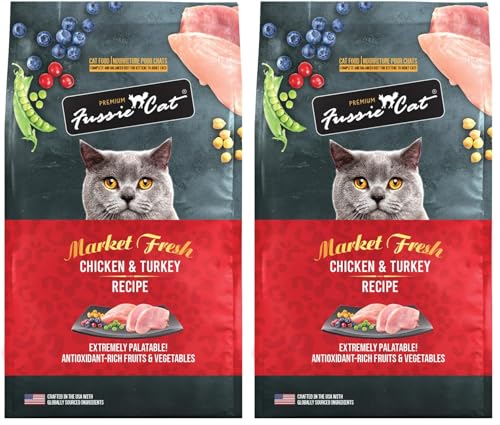Why Cat Food Is Important for Cats
Cat food plays a crucial role in keeping your feline friend healthy and happy. Here are a few reasons why cat food should be the mainstay of your cat’s diet:
- Special Nutritional Needs: Cats have unique dietary requirements that differ from other animals. They need specific nutrients such as taurine, arachidonic acid, and vitamin A, which are essential for their overall well-being. These nutrients are found in abundance in high-quality cat food.
- Protein Power: Cats are obligate carnivores, which means they require a diet rich in animal protein. Protein is vital for muscle development, growth, and repair. It also provides the necessary energy for your cat’s daily activities. Cat food formulated with the right balance of protein sources ensures that your feline friend gets the nutrients they need.
- Balanced Nutrition: Commercial cat food is carefully formulated to provide a well-balanced and complete diet for your pet. It includes a combination of proteins, fats, carbohydrates, vitamins, and minerals to meet your cat’s nutritional needs. This helps prevent nutrient deficiencies or imbalances that can lead to health issues.
- Digestive Health: The ingredients in cat food are designed to promote healthy digestion in cats. It contains essential dietary fibers that assist with proper digestion and prevent issues like constipation. Additionally, cat food is formulated to be easily digestible for your cat’s sensitive digestive system.
- Dental Care: Some cat food is specifically designed to promote dental health. The kibble’s texture can help clean your cat’s teeth, reducing the build-up of plaque and tartar. Proper dental care is vital for preventing dental diseases that can cause pain and discomfort.
Remember, while occasional treats like rotisserie chicken can be a tasty addition to your cat’s diet, they should not replace high-quality cat food. Your furry friend needs a well-rounded and balanced diet to thrive. So, make sure to provide them with the nutrition they need by feeding them a good quality cat food.
Now that you know why cat food is important, let’s explore whether cats can have rotisserie chicken as part of their diet.
Understanding the Nutritional Needs of Cats
As a cat lover, you want to ensure that your feline companion is healthy and happy. One of the key factors in maintaining your cat’s well-being is understanding their nutritional needs. Cats are unique animals with specific dietary requirements that differ from other pets, such as dogs. Let’s explore what these nutritional needs are and why they are essential for your cat’s overall health.
Protein Powerhouse
Cats are obligate carnivores, which means they require a diet rich in animal protein. Protein is crucial for cats to build and maintain lean muscle mass. It also supports healthy skin, a shiny coat, and proper functioning of essential organs. When choosing cat food, look for options that list a high-quality protein source, such as chicken, fish, or beef, as the primary ingredient. Ensure that the protein content meets the recommended levels for your cat’s age and activity level.
Balanced Nutrition
In addition to protein, cats need a balanced diet that includes fats, carbohydrates, vitamins, and minerals. Fats provide a concentrated source of energy and aid in the absorption of vitamins. Carbohydrates, although not essential, can provide a source of fiber for digestive health. When selecting cat food, opt for a well-balanced formula that provides all the necessary nutrients for your cat’s optimal health.
Digestive Health
Maintaining a healthy digestive system is crucial for cats. Some cat foods include prebiotic fibers, which promote the growth of beneficial gut bacteria and support digestion. Probiotics can also be beneficial in maintaining a healthy balance of gut bacteria. When introducing a new cat food, it’s important to do so gradually to help prevent gastrointestinal upset. Consult your veterinarian for guidance on selecting the right food for your cat’s digestive needs.
Dental Care
Proper nutrition plays a vital role in maintaining your cat’s dental health. Some cat foods are specifically designed to promote dental health by reducing plaque and tartar buildup. These formulas usually contain a combination of crunchy kibble and specialized ingredients that help clean your cat’s teeth as they chew. Regular veterinary dental check-ups and daily teeth brushing are also essential for optimal dental care.
Can Cats Eat Rotisserie Chicken?
As a cat lover, you may find yourself tempted to share a delicious piece of rotisserie chicken with your furry friend. After all, cats are known to be curious about what’s on our plates. But before you serve them a plateful, it’s important to understand if it’s safe for cats to eat rotisserie chicken.
The Risks of Feeding Rotisserie Chicken to Cats
While cats enjoy the taste of chicken, it’s crucial to note that their digestive systems are different from ours. There are a few factors to consider before giving them a bite:
- Bones: Rotisserie chicken often contains bones, which can be hazardous for cats. Bones can splinter and cause choking, blockages, or internal injuries. It’s best to remove all bones before sharing any chicken with your cat.
- Seasonings: Many store-bought rotisserie chickens are seasoned with garlic, onion, or other spices. These seasonings can be toxic to cats and can lead to digestive issues, anemia, or even damage their red blood cells. It’s important to keep the chicken plain and free of any seasoning.
- High Salt Content: Some rotisserie chicken may be seasoned with salt or contain sodium-rich brine. Excessive salt intake can lead to dehydration and other health problems in cats. A small amount of plain, unsalted chicken is the safest option.
Safe Ways to Share Chicken with Your Cat
If you’re determined to share a small portion of rotisserie chicken with your cat, follow these guidelines to ensure their safety:
- Plain and Boneless: Remove all bones and any fatty or seasoned parts from the chicken.
- Moderation is Key: Only offer a small amount as a treat, not as a regular part of their diet.
- Watch for Reactions: Observe your cat for any adverse reactions such as vomiting, diarrhea, or changes in behavior. If any concerns arise, consult your veterinarian immediately.
Remember, while cats can enjoy the taste of chicken, it should never become a staple of their diet. A balanced and nutritionally complete cat food is essential to provide all the necessary nutrients for their overall health and well-being.
So, the next time you’re enjoying a delicious rotisserie chicken, keep these guidelines in mind to keep your beloved feline friend safe and healthy.
The Benefits and Risks of Feeding Cats Rotisserie Chicken
Feeding cats rotisserie chicken can be tempting, especially when they give you those adorable, pleading eyes. While it’s true that cats may enjoy the taste, it’s important to consider both the benefits and risks before sharing this treat with them.
The Benefits
1. Protein-rich: Rotisserie chicken is packed with protein, which is essential for a cat’s overall health and well-being. It helps maintain strong muscles, supports their immune system, and promotes healthy skin and coat.
2. Variety and Taste: Offering your cat a small amount of rotisserie chicken can provide a change of flavor and texture in their diet. It can be a special treat that adds excitement to their mealtime.
3. Bonding Opportunity: Sharing a small piece of rotisserie chicken with your cat can create a special bonding moment. It’s a chance to show them love and affection while enjoying a delicious snack together.
The Risks
1. Bones: One of the biggest risks of feeding cats rotisserie chicken is the presence of bones. Chicken bones can be a choking hazard or cause damage to your cat’s throat or digestive system. Always be cautious and remove all bones before sharing it with your feline friend.
2. Toxic Seasonings: Many store-bought rotisserie chickens are seasoned with spices that can be harmful to cats. Ingredients like garlic and onion powder can be toxic and should be avoided. Stick to plain, unseasoned chicken to ensure your cat’s safety.
3. High Salt Content: Rotisserie chickens often have a high salt content, which can be harmful to cats. Excessive salt intake can lead to dehydration, kidney problems, and other health issues. It’s important to limit the amount of salt your cat consumes.
Remember, while a small piece of rotisserie chicken can be enjoyed occasionally, it should never replace a balanced and nutritionally complete cat food. Always consult with your veterinarian before introducing any new food into your cat’s diet to ensure their well-being.
Other Articles in the Series
Don’t miss our other articles that delve into more cat-related topics:
- “The Importance of a Balanced Diet for Cats”
- “Choosing the Best Cat Food for Your Feline Friend”
- “Understanding Your Cat’s Nutritional Needs”
How to Safely Introduce Rotisserie Chicken into Your Cat’s Diet
If you’re considering adding rotisserie chicken to your cat’s diet, it’s important to do so safely. Here are some tips to help you introduce this tasty treat without compromising your cat’s health:
- Boneless and Skinless: When feeding your cat rotisserie chicken, always make sure it is boneless and skinless. Bones can be a choking hazard for cats, and the skin may contain seasonings that could be harmful to their digestive system. So, before you offer the chicken to your furry friend, remove any bones and peel off the skin.
- Quantity Control: While rotisserie chicken can be a healthy addition to your cat’s diet, it should only be given in moderation. Remember, cats have specific dietary needs, and too much chicken can upset their delicate balance. As a general guideline, limit the amount of chicken to no more than 10% of their daily calorie intake.
- Unseasoned and Unsalted: Cats are sensitive to certain spices and seasonings that we humans use to flavor our food. To keep your cat safe, make sure the rotisserie chicken is unseasoned and unsalted. Seasonings like garlic, onion, and salt can cause serious health issues for cats, including anemia and kidney damage.
- Meal Additive, Not a Replacement: Although rotisserie chicken can provide protein and variety to your cat’s diet, it should never replace their regular cat food. Cat food is specifically formulated to meet their nutritional needs, and a balanced diet is crucial for their overall health. Rotisserie chicken should always be a supplemental treat, not a substitute.
By following these guidelines, you can safely introduce rotisserie chicken into your cat’s diet. Remember, your cat’s health and well-being should always be your top priority. So, enjoy sharing a small piece of rotisserie chicken as an occasional treat and bond with your feline friend, while ensuring they’re getting the nutrition they need from a balanced cat food.
Conclusion
Now that you have all the information you need, you can safely introduce rotisserie chicken into your cat’s diet. Remember to always feed boneless and skinless chicken to avoid any choking hazards. It’s crucial to ensure that the chicken is unseasoned and unsalted to prevent any harm to your cat’s health.
While rotisserie chicken can be a tasty treat for your feline friend, it should only make up a small portion of their daily calorie intake. Limit the amount of chicken to no more than 10% to maintain a balanced diet.
However, it’s important to note that rotisserie chicken should never replace a complete and balanced cat food. Prioritize your cat’s health and well-being by providing them with a nutritionally balanced diet that meets all their dietary needs.
By following these guidelines, you can safely incorporate rotisserie chicken into your cat’s diet and give them a special treat from time to time. Your cat will surely appreciate the delicious addition to their meals, while you can have peace of mind knowing that you’re keeping their health in check.
Frequently Asked Questions
Q: Can I feed rotisserie chicken to my cat?
A: Yes, you can feed rotisserie chicken to your cat, but it should only be a supplemental treat.
Q: What precautions should I take while feeding rotisserie chicken to my cat?
A: Make sure the chicken is boneless, skinless, unseasoned, and unsalted to avoid choking hazards and harmful seasonings.
Q: How much rotisserie chicken can I give my cat?
A: Limit the amount of rotisserie chicken to no more than 10% of your cat’s daily calorie intake.
Q: Can rotisserie chicken replace cat food?
A: No, rotisserie chicken should never replace a balanced cat food. It should only be an occasional treat.
Q: What is the importance of prioritizing my cat’s health and well-being?
A: Prioritizing your cat’s health and well-being ensures their overall happiness and longevity. Providing a balanced diet is essential for their nutritional needs.














